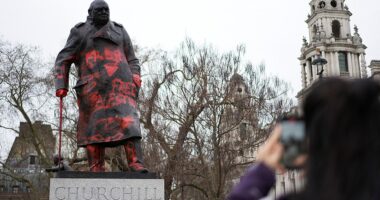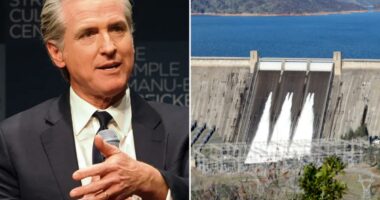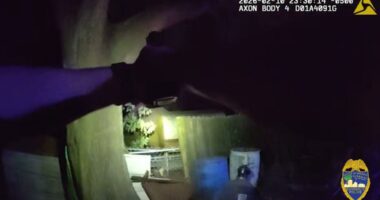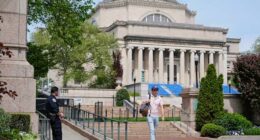Share this @internewscast.com
In the wake of Pope Francis’s death, we remember the moments that led some Christians to view his papacy as a failure to uphold traditional teachings.
Elected in 2013 as the first Jesuit pope, Francis aimed to reform the Catholic Church with a focus on mercy and inclusion, but his decisions often sparked criticism from those who felt he strayed from doctrine.
From his handling of clergy abuse scandals to statements on salvation and marriage, Francis’s actions over his 12-year tenure drew scrutiny. Here are 10 moments that shaped this perspective, based on events reported through April 2025.
Clergy Sexual Abuse Cover-Up
Pope Francis encountered criticism for his management of sexual abuse cases related to Bishop Juan Barros, Cardinal Theodore McCarrick, and the Provolo Institute.
In 2018, while visiting Chile, he initially dismissed the accusations against Barros as “slander,” supporting the bishop who faced allegations of covering up abuse by priest Fernando Karadima.
Following public backlash and a subsequent investigation commissioned by Francis, he issued an apology on April 11, 2018, acknowledging that he had been misinformed, and he accepted Barros’s resignation along with that of two other Chilean bishops in June 2018.
A 2020 Vatican report, released on November 10, 2020, found Francis was not directly responsible for McCarrick’s rise, a U.S. cardinal disgraced after abuse allegations, but highlighted systemic failures in the Church’s response, including inaction by predecessors like Pope John Paul II.
The Provolo case involved deaf children abused at a school in Argentina, with allegations dating back to the 1960s. Critics pointed to delayed Vatican action, as some accused priests, like Nicola Corradi, remained in ministry until their arrest in 2016, with Vatican proceedings only concluding in 2019.
“All Religions Are Paths to God” Statement
In September 13, 2024, Pope Francis stated at a Singapore interreligious meeting, “All religions are paths to God.” The remark was made during a dialogue with Muslim, Buddhist, and Hindu leaders at the Catholic Junior College, aiming to foster unity in a diverse nation.
The Vatican issued a clarification on September 15, 2024, stating that Francis meant all religions seek the divine, but the comment drew criticism from some Christian leaders who argued it undermined biblical teachings, specifically John 14:6, which declares Jesus as the only path to salvation.
Atheists and Salvation Remarks (2013, 2018)
In 2013, Pope Francis said during a homily on May 22 at the Domus Sanctae Marthae that atheists could be saved if they followed their conscience, emphasizing God’s mercy over strict adherence to belief.
In 2018, he reiterated in a meeting with Italian youth on August 11 that non-believers could find redemption through good deeds, as reported by Christianity Stack Exchange.
The 2013 remark came shortly after his election, setting a tone of inclusivity that he expanded in 2018.
Proselytism as “Solemn Nonsense”
During a 2013 conversation with Italian atheist Eugenio Scalfari, Pope Francis called proselytism “solemn nonsense,” according to Paulist Fathers.
The comment was published on October 1, 2013, in La Repubblica, where Francis stressed that faith should attract, not coerce, advocating for evangelization through witness rather than aggressive conversion.
This perspective aligned with his earlier writings as Archbishop of Buenos Aires, where he emphasized dialogue over confrontation.
Some Christians argued he downplayed the importance of sharing the Gospel, a core tenet of Christian mission as outlined in Matthew 28:19-20, known as the Great Commission.
“Children of God” Comment on Pedophile Priests
In 2023, Pope Francis referred to pedophile priests as “children of God” who needed accompaniment, a statement made during a private audience with Jesuits in Portugal on August 4, 2023, while discussing the Church’s response to abuse scandals.
The comment, intended to highlight the need for rehabilitation, drew criticism from victims’ advocates like Marie Collins, who argued it minimized the severity of clergy abuse.
This perspective reflected broader concerns about Francis’s handling of abuse cases, with critics pointing to his leniency toward accused clerics. As Catholic World Report noted in a February 24, 2024, article critiquing his overall approach:
Pope Francis has presided over the appalling miscarriage of justice that has allowed a powerful celebrity artist-cleric not only to escape punishment for the abuse of as many as forty-one victims over three decades but even to remain in ministry as an extern priest resident in Rome.
Hell’s Existence Questioned (2018)
In a 2018 interview with Eugenio Scalfari, Pope Francis reportedly questioned the existence of hell, suggesting souls who reject God might simply “disappear.”
The conversation, published in La Repubblica on March 29, 2018, sparked immediate controversy among Christians who hold hell as a core Catholic teaching, affirmed in the Catechism:
The teaching of the Church affirms the existence of hell and its eternity. Immediately after death the souls of those who die in a state of mortal sin descend into hell, where they suffer the punishments of hell, ‘eternal fire.’ The chief punishment of hell is eternal separation from God, in whom alone man can possess the life and happiness for which he was created and for which he longs. (Catechism, 1035)
The Vatican issued a statement the same day, clarifying that Scalfari’s account was not a direct quote but a reconstruction, and reaffirmed Church teaching on hell.
Amoris Laetitia and Communion for Divorced/Remarried (2016)
The 2016 apostolic exhortation Amoris Laetitia, released on April 8, 2016, allowed some divorced and remarried Catholics to receive Communion under certain conditions, following the 2014-2015 Synod on the Family.
The document emphasized pastoral discernment, suggesting that priests could accompany couples in “irregular situations” to discern their path to the sacraments.
Critics, including traditionalists like Cardinal Raymond Burke, argued it contradicted Church teaching on the indissolubility of marriage:
Of course, because, for instance, if you take the marriage issue, the Church teaches that marriage is indissoluble, in accord with the word of Christ, ‘He who divorces his wife and marries another commits adultery.’ Therefore, if you are divorced, you may not enter a marital relationship with another person unless the indissoluble bond to which you are bound is declared to be null, to be nonexistent. – (Cardinal Raymond Burke)
Pachamama Incident at Amazon Synod (2019)
During the 2019 Amazon Synod, wooden statues identified as “Pachamama” were displayed in the Vatican, per Catholic World Report.
The figures, brought by indigenous leaders from the Amazon, were placed in the Santa Maria in Traspontina church on October 4, 2019, and used in a Vatican Gardens ceremony attended by Francis.
Some Christians viewed them as idolatrous, associating “Pachamama” with a South American fertility goddess, leading to their removal into the Tiber River by Austrian activist Alexander Tschugguel on October 21, 2019
Francis apologized for the incident on October 25, 2019, during the synod, stating that the statues were retrieved and clarifying that they were meant to represent life and fertility, not worship.
The event fueled debates about syncretism in the Church, especially given Francis’s focus on indigenous inclusion.
Approval of Blessings for Same-Sex Unions (2023)
In December 2023, the Vatican document Fiducia Supplicans, released on December 18, 2023, permitted blessings for same-sex unions.
The decision faced opposition from Christians, arguing it contradicted traditional teachings on marriage as between a man and a woman.
The document was part of Francis’s broader push for inclusion, following his 2020 remarks supporting civil unions, but it deepened divisions within the global Church.
Criticism of Traditionalist Catholics and Latin Mass Restrictions (2021)
In 2021, Pope Francis restricted the Traditional Latin Mass through Traditionis Custodes, issued on July 16, 2021, citing its use by traditionalists to oppose Vatican II reforms.
In an accompanying letter to bishops, he criticized traditionalist Catholics for rigidity, arguing the 1962 Missal fostered division by being used to reject the liturgical reforms of the Second Vatican Council (1962-1965).
The decision reversed Pope Benedict XVI’s 2007 motu proprio Summorum Pontificum, which had allowed wider use of the Latin Mass. Some bishops, like those in Costa Rica, banned the old rite entirely, while others, such as in Arlington, Virginia, permitted limited use.
As Pope Francis’s legacy is debated following his death, these moments leave a deeply fractured Christian community wrestling with the long-term impact of his reforms.
His papacy, marked by a vision of inclusion that sought to embrace the marginalized—whether through blessings for same-sex unions, Communion for the divorced and remarried, or interfaith dialogue—has sparked fierce resistance from those who argue that such inclusivity compromises the faith’s core tenets, including the exclusivity of salvation through Christ and the indissolubility of marriage.
Traditionalists lament the restrictions on the Latin Mass as a loss of sacred heritage, while survivors of clergy abuse continue to demand accountability, pointing to cases like Marko Rupnik’s as evidence of systemic failures.

















